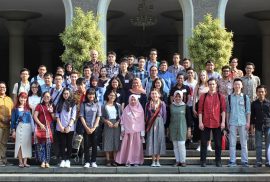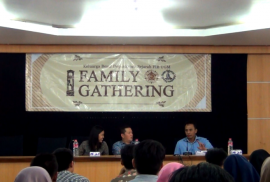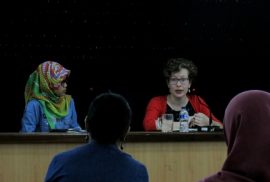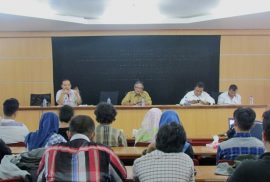As citizens of modern Southeast Asia, we often take for granted nation-state that in fact is a new concept. Not only it is contemporary, border that demarcate states both on water and land is innately artificial and porous. Department of History, Faculty of Cultural Sciences UGM initiated “International Summer School on Southeast Asian Studies; Transnational History: Becoming a Cosmopolitan Historian” to promote perspective that transcends border for young and potential researchers. The summer school took place at Faculty of Cultural Sciences Universitas Gadjah Mada from 27th August– 6th September 2018. Participants of this summer school are undergraduate and graduate students as well as young lecturers from Australia, Japan, Malaysia, Thailand, United States, and Vietnam. This summer school also incorporates Indonesian students from state universities throughout the country.
As citizens of modern Southeast Asia, we often take for granted nation-state that in fact is a new concept. Not only it is contemporary, border that demarcate states both on water and land is innately artificial and porous. Department of History, Faculty of Cultural Sciences UGM initiated “International Summer School on Southeast Asian Studies; Transnational History: Becoming a Cosmopolitan Historian” to promote perspective that transcends border for young and potential researchers. The summer school took place at Faculty of Cultural Sciences Universitas Gadjah Mada from 27th August– 6th September 2018. Participants of this summer school are undergraduate and graduate students as well as young lecturers from Australia, Japan, Malaysia, Thailand, United States, and Vietnam. This summer school also incorporates Indonesian students from state universities throughout the country.
Organized by History Department, Faculty of Cultural Sciences and Faculty of Social and Political Sciences, Universitas Gadjah Mada
Transnational history has produced a significant body of work since its development in the late 1980s and early 1990s. This approach owed its inception as part from the shift from political history that was comfortably located within the national narrative toward social and cultural history in the 1970s and 1980s that developed perspectives such as race, ethnicity, class, and gender that was localized and non-national. These developments, unfortunately, had worried historians because of the parochial and antiquarian nature of local histories. The early 1990s and 2000s saw the publication of David Thelen’s Toward the Internationalization of American History and Thomas Bender’s Rethinking American History in Global Age from which efforts to provincialize and denationalize American history has pointed the way for a true dialogue of experts from all parts of the world in imagining differential spaces other than that of the nation-state. This is needed in order to construct an American historiography that could meet the current needs of a globalizing world and place it with emphasis on a perspective of the future. Instead of focusing on local phenomenon, the emphasis was on understanding social, cultural and political ones as a transnational process; reconceptualizing identities, communities, and products within different transnational framework; for instance, Hollywood movies as it was received and recreated on other parts of the globe and thus seeing it not merely as an American cultural product, but a wider globalizing phenomenon. Bruce Mazlish and Ralph Buultjen’s edited volume Conceptualizing Global History expands this further by bringing forth ideas in developing global narratives of local or non-national identities and spaces. Two approaches that were identified by Thelen has been to focus on either borderlands, as liminal spaces in which national units undergo transformative shifts, and the comparative approach, not merely as a means for national historians to compare each other’s narratives but to create new perspective altogether that is both national and international.
Organized by History Department, Faculty of Cultural Sciences and Faculty of Social and Political Sciences, Universitas Gadjah Mada
Transnational history has produced a significant body of work since its development in the late 1980s and early 1990s. This approach owed its inception as part from the shift from political history that was comfortably located within the national narrative toward social and cultural history in the 1970s and 1980s that developed perspectives such as race, ethnicity, class, and gender that was localized and non-national. These developments, unfortunately, had worried historians because of the parochial and antiquarian nature of local histories. The early 1990s and 2000s saw the publication of David Thelen’s Toward the Internationalization of American History and Thomas Bender’s Rethinking American History in Global Age from which efforts to provincialize and denationalize American history has pointed the way for a true dialogue of experts from all parts of the world in imagining differential spaces other than that of the nation-state. This is needed in order to construct an American historiography that could meet the current needs of a globalizing world and place it with emphasis on a perspective of the future. Instead of focusing on local phenomenon, the emphasis was on understanding social, cultural and political ones as a transnational process; reconceptualizing identities, communities, and products within different transnational framework; for instance, Hollywood movies as it was received and recreated on other parts of the globe and thus seeing it not merely as an American cultural product, but a wider globalizing phenomenon. Bruce Mazlish and Ralph Buultjen’s edited volume Conceptualizing Global History expands this further by bringing forth ideas in developing global narratives of local or non-national identities and spaces. Two approaches that were identified by Thelen has been to focus on either borderlands, as liminal spaces in which national units undergo transformative shifts, and the comparative approach, not merely as a means for national historians to compare each other’s narratives but to create new perspective altogether that is both national and international.
On Saturday 9th September 2017, Department of History UGM held a “family gathering” in Multimedia Room, Margono Building, Faculty of cultural science UGM. This event was a form of collaboration between department and Keluarga Alumni Sejarah Gadjah Mada (KASAGAMA) which then also involved students as the executor. This event was one of the series of welcoming new students of History 2017. The theme of this event is “History and Prospects of the World of Work”.
There were three resource persons in this event who shared their experiences about the prospects for the world of work in the field of historical studies. They are Zakaria Effendi, Rina Widyastuti, and Sambodo. Rina Widyastuti, who now has a career at Tempo, explained that her knowledge supports her profession, which is currently pursuing journalism. In History, she is required to always be diligent in writing and that is what makes her accustomed to working under pressure.
Pada sabtu (9/9/17) Departemen Sejarah UGM mengadakan “Family Gathering” di ruang Multimedia, Gedung Margono FIB UGM. Acara ini merupakan bentuk kerjasama, antara Departemen dan Keluarga Alumni Sejarah Gadjah Mada (KASAGAMA), yang kemudian turut melibatkan elemen mahasiswa sebagai eksekutornya. Tujuan diadakannya acara ini adalah sebagai salah satu rangkaian menyambut mahasiswa baru Ilmu Sejarah 2017. Tema yang diangkat adalah “Sejarah dan Prospek Dunia Kerja”.
Pada kegiatan itu, terdapat tiga narasumber yang membagikan pengalamannya terkait prospek dunia kerja bidang studi sejarah. Mereka adalah Zakaria Effendi, Rina Widyastuti, dan Sambodo. Rina Widyastuti yang sekarang berkarir di Tempo menerangkan bahwa ilmunya menunjang profesinya yang sekarang menekuni dunia jurnalistik. Sejarah yang dituntut selalu tekun dalam menulis membuat ia terbiasa bekerja dalam tekanan.
Colonial education was always synonymous with ethical politics. A policy of repaying the colony’s land, rather than previously exploiting it. This resulted in historiography discussing colonial education always focused on the government. That education cannot be born without government intervention – the Dutch East Indies. This was stated by Kirsten Kamphius in a seminar entitled ‘Our Girls’: Taman Siswa as an example Gendered education in the Netherland Indies 1922-1942, on Wednesday (19/7) in the Multimedia Room of the Margono Building, FIB UGM.
Pendidikan masa kolonial selalu identik dengan politik etis. Sebuah kebijakan balas budi kepada tanah koloni, alih-alih sebelumnya mengekploitasi. Hal ini berakibat pada historiografi yang membahas pendidikan kolonial selalu berfokus pada pemerintah. Bahwa pendidikan tidak bisa lahir tanpa ada campur tangan pemerintah –Hindia Belanda. Hal itu diutarakan Kirsten Kamphius dalam seminar yang bertajuk ‘Gadis-Gadis Kita’ : Taman Siswa as an example Gendered education in the Netherland Indies 1922-1942, pada Rabu (19/7) di Ruang Multimedia Gedung Margono FIB UGM.
Talk with the alumni of the history department, Universitas Gadjah Mada, which was named “Alumni Menyapa” was held in the Multimedia room, 2nd floor of Margono Building FIB UGM, on Monday, 15th May. The talk with history alumni was the inaugural edition and took the theme ‘History and the World of Work’. The activity, which was packaged in the format of a talk show and interactive dialogue, was a work program of the Gadjah Mada History Alumni Family (KASAGAMA) in collaboration with the Department of History, Faculty of Cultural Science UGM.
Bincang dengan alumni sejarah UGM, yang diberi nama ‘Alumni Menyapa’ digelar di Ruang Multimedia, Gedung Margono lt. 2 FIB UGM pada Senin (15/5). Bincang dengan alumni sejarah itu merupakan edisi perdana dan mengambil tema ‘Sejarah dan Dunia Kerja’. Kegiatan yang dikemas dengan format talkshow dan dialog interaktif itu merupakan program kerja dari Keluarga Alumni Sejarah Gadjah Mada (KASAGAMA) yang bekerja sama dengan Departemen Sejarah FIB UGM.
Acara diisi oleh narasumber yang bekerja di berbagai bidang. Para narasumber kemudian membagi pengalamannya meniti karir dengan mahasiswa tingkat akhir Program Sarjana dan Pascasarjana Departemen Sejarah FIB UGM.





